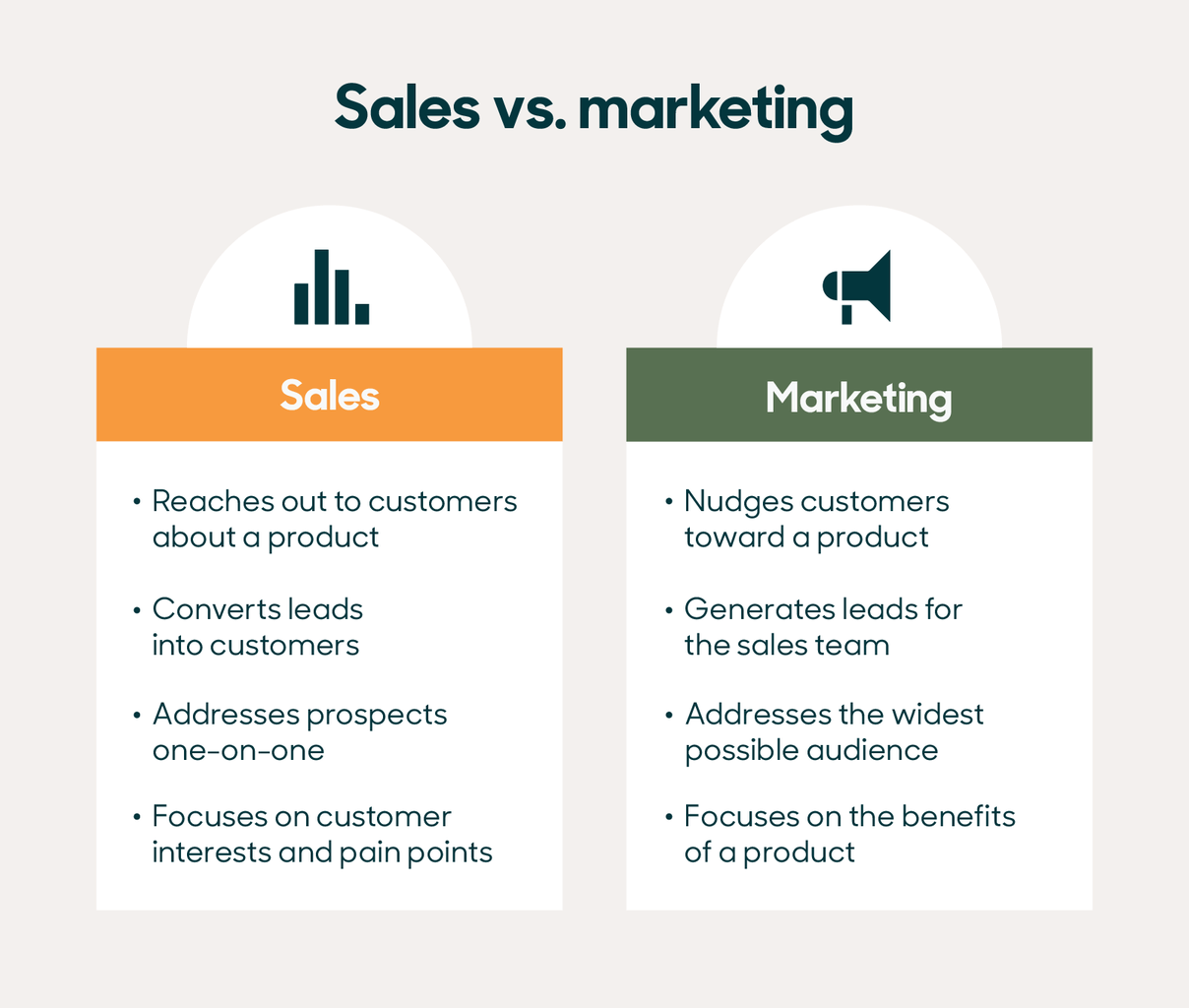When it comes to business growth and customer reach, both marketing and sales play indispensable roles. Ask any successful entrepreneur, and they will testify to the power of effective marketing and sales strategies. However, marketing and sales are not the same; they are distinct functions that require different skillsets and approaches. Marketing focuses on creating awareness and generating interest, while sales aim to convert that interest into confirmed purchases and continued customer loyalty. Let’s dive deep into the individual nuances of these two pivotal components of business.
Are you curious to know how marketing and sales differ and how they work together for business success? Keep reading to explore their unique contributions and synergies in greater detail.
Introduction to the Concept of Marketing and Sales
Marketing and sales, though often used interchangeably, are not synonymous. A common misconception is that both serve the same purpose. While it is true that both functions ultimately contribute to the profitability and growth of a business, they do so in different ways. Marketing crafts the narrative around a brand and its products, striving to engage potential customers, while sales take this engagement and turn it into actual, tangible business deals.

Source: Zendesk
Primary Objectives and Focus of Marketing
Marketing is about storytelling and connection. It folds in a blend of creativity, analysis, and strategic planning to tell the world about your business. The primary objectives of marketing include:
- Building Brand Awareness: Crafting the face and story of your business that resonates with consumers.
- Targeting Potential Audience: Identifying and communicating with the demographic most likely to be interested in your product or service.
- Generating Leads: Through various means of engagement, marketing aims to gather prospects that show potential interest in what the business offers.
By weaving these goals into strategies, marketing paves the way for sales to step in and seal the deal.
Primary Objectives and Focus of Sales
Sales is where strategy meets execution. The objectives in this domain are clear-cut and revolve around:
- Direct Interaction with Clients: Sales professionals reach out to leads with a personal touch, aiming to convert them into customers.
- Transaction Conversion: The single most important goal – turning leads into sales and thus generating revenue.
- Customer Relationships: Post-sale, sales personnel work to retain customers, ensuring their journey continues positively with the brand.
The Collaboration and Conflict Between Marketing and Sales

Synergy in Goals Despite Different Approaches
Marketing and sales, though distinct in their operations, are united in their core aim: to drive revenue and foster business growth. The first lays the groundwork, while the other brings home the victory. As Forbes points out, marketing activities set the stage for the valuable transactions that salespeople close.
Marketing Strategies and Sales Tactics
The approach marketing takes is generally a broad one, aimed at reaching as wide an audience as possible. Marketers use content creation, social media campaigns, search engine optimization, and more. On the other hand, sales tactics are more personalized and direct, focusing on individual customer’s needs and closing deals through direct communication channels.
Potential Frictions and Their Resolution
Differences in approach and goals can sometimes lead to friction between the two departments. It is crucial to address these misalignments to prevent internal conflict and ensure the machinery of business runs smoothly. This calls for alignment strategies that bring marketing and sales into a coherent, collaborative relationship.
Scope and Tactics: How They Differ in Practice
Differences in Scope
The scope of marketing is broad and holistic, encompassing activities that create top-of-funnel awareness. Sales, in contrast, digs deep into the bottom-of-funnel efforts, concentrating on individuals who are ready to buy.
Marketing Tactics vs. Sales Tactics
The nature of customer outreach significantly diverges between marketing and sales. Marketing tactics may include engaging potential clients through storytelling and content, whereas sales tactics often involve more direct forms of communication such as face-to-face meetings or phone calls.
Tools and Resources Used by Each Department
Each department brings its own set of tools to the table; marketers might rely on customer relationship management (CRM) platforms to organize leads and analytics tools to measure campaign success, while sales professionals often utilize account management software and direct pitches to clinch deals.
The Roles and Expertise Required in Marketing and Sales
Looking into the specific roles within each field, it becomes apparent just how specialized each department is.
Marketing Roles
- Market Research Analysts: They gather and analyze data on consumer trends.
- Content Creators: The storytellers who craft compelling messages.
- Campaign Managers: The strategists who plan and execute marketing initiatives.
Sales Roles
- Direct Sales Representatives: The front-line negotiators who seal the deals.
- Account Executives: Those who manage and grow client accounts.
- Customer Success Managers: Ensuring customers are satisfied and nurtured post-sale.
Necessary Skills for Each Field
- Marketing Skills: A mix of creativity, analytical prowess, and strategic thinking is crucial for effective marketing.
- Sales Skills: Interpersonal abilities, coupled with strong product knowledge and persuasive communication skills, are key in sales.
Career Paths and Opportunities in Marketing vs Sales
Growth and Development in Marketing
Marketing offers a rich career path, from entry-level positions to potentially growing into roles like marketing director or chief marketing officer. For those with an eye for market trends and a passion for communication, the sky is the limit.
Growth and Development in Sales
Sales, too, presents a ladder of opportunity. Starting out as sales reps, individuals can climb to become team leaders or sales managers, with the potential to eventually take charge of entire sales departments.
Exploring Educational Backgrounds for Careers in Both Fields
While there is a diverse range of backgrounds people can come from, typically, degrees in marketing, communications, or business lay a solid foundation for either path. These educational experiences provide a breadth of knowledge that can be applied to the numerous aspects of marketing and sales roles.
Real-World Applications and Impact
Case Studies in Successful Marketing Campaigns
Looking at successful marketing campaigns provides insight into the innovation and reach marketing can achieve. Campaigns that resonate with audiences on an emotional level or fulfill a societal need tend to have excellent outcomes.
Case Studies in Effective Sales Strategies
Conversely, sales strategies that personalize the buyer’s experience or that utilize data-driven insights can dramatically increase conversion rates and loyalty, driving revenue upwards.
Impact on Business Growth and Customer Relations
Both departments are responsible for not just brief surges in profits but in fostering a robust, loyal customer base. They serve as the twin engines propelling the vehicle of business forward.
The Future of Marketing and Sales
Emerging Trends and Technologies in Marketing
The digital world is constantly reshaping marketing. From the rise of AI and machine learning to sophisticated data analytics, marketers are finding new ways to target and engage audiences.
Emerging Trends and Technologies in Sales
Sales is also adopting cutting-edge technologies, with AI-driven CRM tools and predictive analytics changing the way they understand and interact with clients.
The Integration of Sales and Marketing in Business Strategy
Some businesses now choose to blend marketing and sales roles into a cohesive, unified approach. This integration prioritizes seamless communication between the two to ensure the brand message is consistent and effective from first touch to final sale.
—
Concluding, marketing and sales may share the commonality of driving business success, but they are not the same. Each serves a specific purpose and requires distinct strategies, tools, and expertise. As mentioned in our post on What is Content Marketing?, understanding the separate yet interconnected roles of marketing and sales is vital for building effective business strategies. Embrace both, and watch your business flourish.

